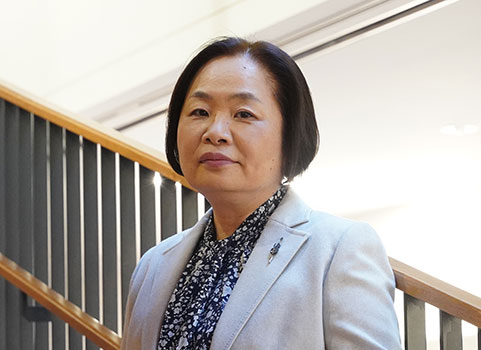
Research & Education Advisor, Kanto Gakuin University

President, Designcare Inc.

Vice-Director of Kitasato University Hospital, Director of Nursing
Read on to gain firsthand insights from nursing professionals on the evolution of their profession, ways in which we can enhance support for their well-being and career development, as well as the crucial roles they play in communities.
From your experience, how have you seen the nursing profession evolve in recent years?
The evolution of the nursing profession has shown that nurses now play a variety of roles in every health system. It is crucial that, when responding to this change in responsibilities, patients must remain the main priority in the care being delivered. But with reforms in the working style of physicians in particular in Japan, the care provided by nurses has now been affected as more tasks have become their responsibility. It is therefore important not to lose sight of the patient at the heart of care.
Masako Kanai-Pak, Research & Education Advisor, Kanto Gakuin University
What are the key opportunities for nurses to shape the future of healthcare?
In light of the growing emphasis on community-based integrated care, we believe that the broader adoption of digital tools such as telemedicine and remote care will be an essential component in ensuring universal healthcare coverage. In addition, it is vital that we generate awareness of the value nurses bring to all parts of society. So that we can clearly demonstrate the positive role nurses play in terms of both improving clinical outcomes and providing patients with well-being support throughout their care journey.
Yasuhira Fujino, President, Designcare Inc.
In your opinion, how can the nursing profession better support self-care and well-being for nurses?
In my opinion, in order to better support self-care and well-being for nurses the working environment needs to be improved. To do this, all non-nursing specific tasks should be shifted to other professions. We should acknowledge and promote the different working styles within our workforce, and also plan staffing to match the acuity levels of patient's. In addition, scientific data on the actual state of nursing work should be collected and improvements made to the system on the basis of this data.
Masako Kanai-Pak, Research & Education Advisor, Kanto Gakuin University
How do you think nurses can be better recognised for their contributions to patient care and the healthcare system?
Using data to visualize the care nurses provide is vital. We shouldn't just talk about it; we need to share it widely in society. It's important to create value in a patient's life, focusing on improving their well-being along with medical outcomes. Additionally, we should continuously explore ways to enhance our medical system for the benefit of society.
Yasuhira Fujino, President, Designcare Inc.
How can the nursing profession better support ongoing professional development for nurses?
Institutions must consider the career of each nurse. Managers should be interested in both the interests of their institutions and society. By supporting the career development of each nurse, we believe that even if the workplace changes, the public will benefit more. Many managers hope to help develop professionals who always keep the public interest in mind.
Chie Beppu, Vice-Director of Kitasato University Hospital, Director of Nursing
What role does the nursing workforce play in educating their community beyond the bedside?
Nurses play an essential role in our communities, providing support to our citizens and helping them manage their illnesses in a way that works best for them. In Japan, nurses in particular have taken on more responsibilities from doctors, which affects the care they provide. So, in order to maintain the health of our citizens, we should reduce the number of tasks nurses perform so that they can focus on caring for their communities, rather than simply alleviating the work of doctors.
Chie Beppu, Vice-Director of Kitasato University Hospital, Director of Nursing
Cookies são usados neste site. Para recusar ou saber mais, visite nosso conheça nosso aviso de cookies.
Copyright © 2025 Elsevier, its licensors, and contributors. All rights are reserved, including those for text and data mining, AI training, and similar technologies.